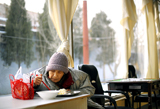Beijing looms large in US policy
By Sushil SethMonday, Feb 01, 2010, Page 8
| ‘China appears to believe that the time has come to assert its power as the Middle Kingdom.’ |
| |
It would also like to be actively involved in building up Asia’s security and economic structures and would like collaborative action on issues like nuclear proliferation, climate change and food security.
At the same time, Clinton emphasized the significance of regional forums in these matters.
Without mentioning China, she said that no country, including the US, should try to dominate regional institutions — but she also emphasized the beneficial role of US engagement in the region.
In other words, the US is back in Asia to re-engage with the region. What exactly led the US secretary of state to reassert US engagement with Asia?
First, under the administration of former US president George W. Bush, the preoccupation with Iraq, Afghanistan and the “war on terror” led to slackening interest in Asia.
The administration of US President Barack Obama is keen to dispel that view, which has gained increasing currency.
Second, the Bush presidency was more given to unilateral initiatives than to multilateral forums like ASEAN, APEC, the East Asia Summit or the UN.
China, on the other hand, had reversed its aversion to regional forums, having earlier feared their domination by the US.
With their new economic and political clout, they found these forums very useful for expanding their regional role.
In other words, the US pre-occupation with Iraq and Afghanistan and indifference to the potential of Asian regional cooperation proved a blessing for Beijing.
In the process, China was able promote and expand its role as a “benign” power supportive of regional institutions.
For instance, Beijing has been able to cobble together a free-trade agreement with the members of ASEAN.
It is timely for the US to be showing new interest in engaging with Asia. Until now, the Obama administration has seemed to focus on forging a new regional and global partnership with China.
The underlying assumption was that China’s partnership was necessary to resolve tricky issues like nuclear proliferation in North Korea and Iran, climate change, the global financial crisis and the undervalued Chinese currency.
But there apparently has been a growing sense of frustration with China’s cavalier and arrogant response, climaxing at the climate change conference in Copenhagen.
The US feels that China sabotaged the conference and humiliated Obama.
And then there’s the matter of Google. So far, Internet giants like Google, Yahoo and others have been toeing Beijing’s line by censoring their content as required by the Chinese authorities.
But when Chinese hackers started attacking the Gmail accounts of human rights activists and stealing source codes and data from Google (as well as 33 other high-tech, industrial and chemical companies), Google blew the whistle.
Google legal officer David Drummond said on the company’s blog: “We have taken the unusual step of sharing information about these attacks with a broad audience not just because of the security and human rights implications of what we have unearthed, but also because this information goes to the heart of a much bigger debate about freedom of speech.”
He added that it had “led us to conclude that we should review the feasibility of our business operations in China.”
Google has thus put this issue in a larger context of freedom of speech and human rights — and it has the support of the Obama administration.
White House press secretary Robert Gibbs said: “We support Google’s action. Our concern is with actions that threaten the universal rights of a free Internet.”
China obviously takes a different view. According to the State Council Information Office, “Our country is at a crucial stage of reform and development and this is a period of marked social conflicts.”
As a result, “Properly guided internet opinion is a major measure for protecting Internet information security,” it says.
This is an interesting admission of the acute social conflict in China.
Despite Chinese President Hu Jintao’s (胡錦濤) “harmonious society” slogan, China is going through a social crisis.
What this means is that regardless of all the hype about China’s uninterrupted and on-going rise, its future is subject to the vagaries of how this crisis is managed and resolved.
Considering that China is a top-heavy, one-party state, it lacks the political shock absorbers and the process of political mediation as exercised through popular elections as well as alternative political structures and constitutional forums.
No wonder the Chinese Communist Party sees the Internet as a serious threat to its rule and will go to any length to disrupt and control it.
But the Internet will always remain a challenge because of the multiple ways in which determined users can circumvent government censorship of its content.
Google’s threat to pack up its bags and abandon the Chinese market has created a serious strain in US-China relations.
It has come on top of persistent attempts by Chinese hackers to get into the Pentagon and other US agencies in an ongoing cyber warfare of sorts, with serious implications.
It has led the US and some other Western countries to beef up their security systems against potential intrusions. Australia is the latest country to set up a separate agency to deal with this risk.
The effects of Chinese hacking is widespread. Some reports say the FBI has estimated that as many as 180,000 Chinese are engaged in hacking and that they attacked the Pentagon’s computer systems 90,000 times last year alone.
The US is the most prized target of Chinese hackers.
China’s cyber army (although Beijing denies any official link) is part of a wider strategy to wear down the US at a time when it is overstretched militarily, financially and, to some degree, psychologically.
Having followed late leader Deng Xiaoping’s (鄧小平) advice to bide its time and build strength, China appears to believe that the time has come to assert its power as the Middle Kingdom.
And it is in Asia that it is building up its military power to challenge the US over the next decade or so.
It is developing weapons systems to deny the US access to some of the waterways in Asia, like the South China Sea, where there have already been some naval incidents between China and the US.
China is developing a set of weapons not only to deter the US but, if necessary, to take it on. These include submarines, a new generation of combat aircraft, cruise missiles and even ballistic missiles that could target US aircraft carriers.
It is about time the US engages actively with Asia.
Sushil Seth is a writer based in Australia.



